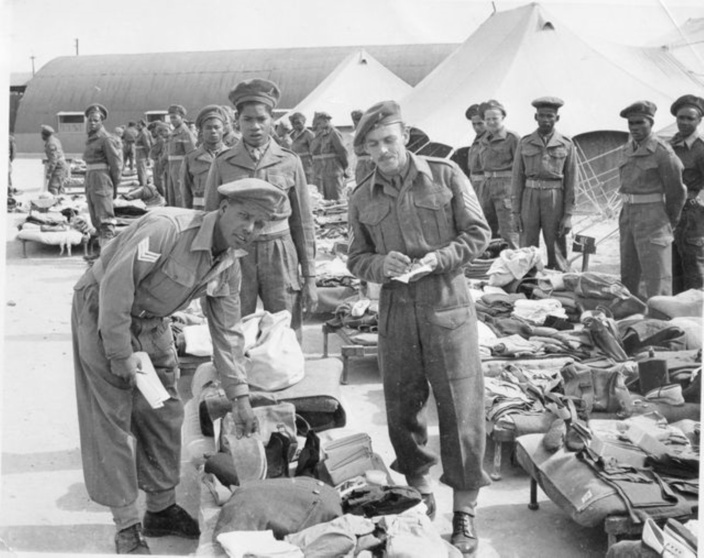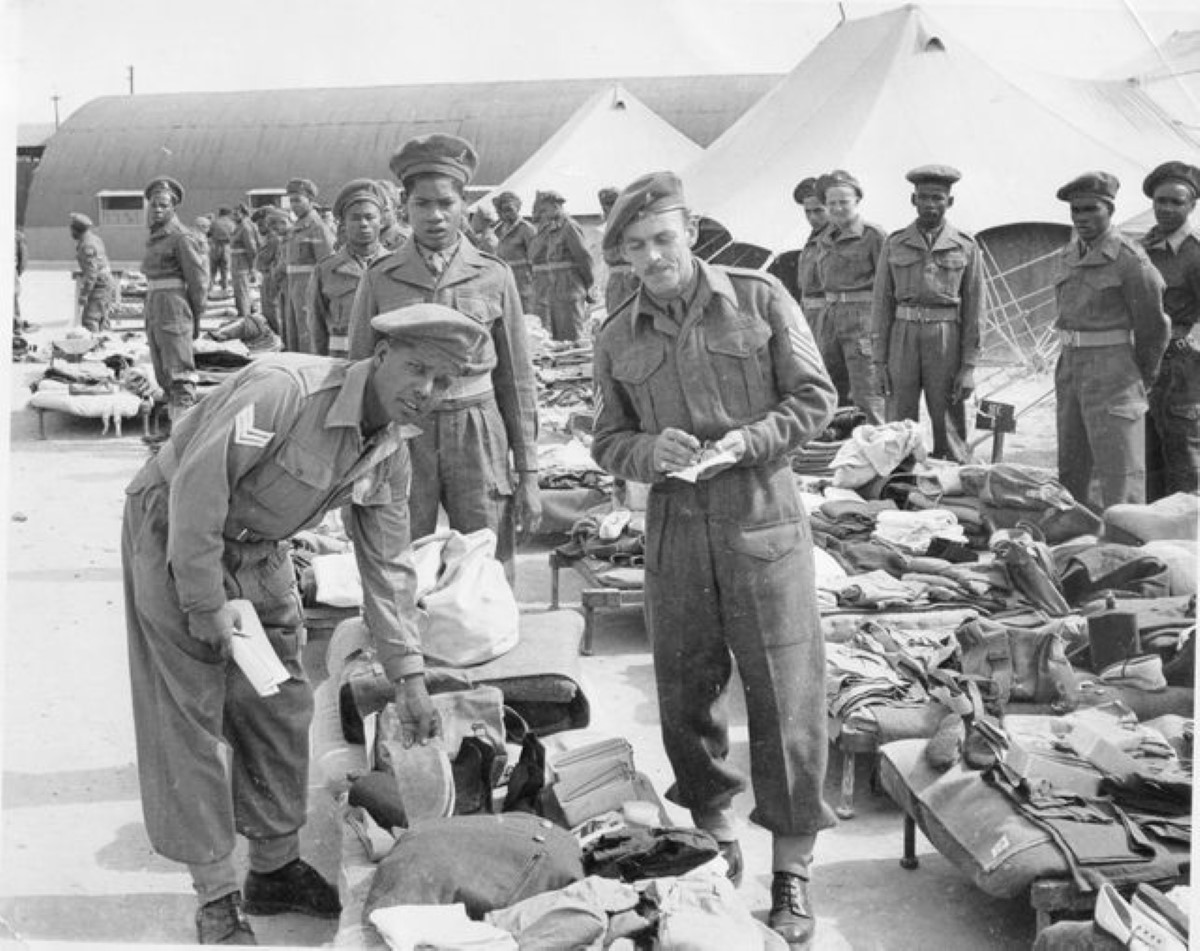
The photo shows Sgts Juggernauth and Donaldson on the foreground of 2 Trg Coy inspecting Mauritian soldiers' gear soon after they had landed in North Africa.
VE Day was greeted with all the paraphernalia of victory throughout the British empire. In Mauritius, the Council of Government held a special session and announced a 2-day public holiday, the cannons at Port Louis fired a salvo, church bells rang throughout the island, the Police Band entertained at the Champ de Mars, the Town Hall, the Luna Park and the Majestic were illuminated, there was a Chinese dragon procession, fireworks at Champ de Mars, bonfires at the Fort Adelaide (La Citadelle) and on Signal Mountain, and flags and bunting festooned the streets.
At Champ de Mars a huge Union Flag hung from the grandstand & the Governor, resplendent in the white dress uniform and pith helmet of the Colonial Service, took the salute.
After the victory over Japan there were further celebrations. A reception was held at Le Réduit on 24 August, and a grand parade took place at Port Louis on 30 August; 6 September was declared a public holiday, and around 50 000 people attended a gathering at Champ de Mars.
For many Mauritians their relatives never came back, or returned disabled. An estimated 350 Mauritian soldiers had died on the battlefields thousands of miles away from their homeland. Food shortages and price controls continued late into the 1940s, and thousands of soldiers remained overseas. On the announcement of the Japanese surrender the Governor cautioned that people could not expect immediate improvement in conditions in the colony or the immediate return of the thousands of soldiers still overseas.
Measures were put in place to try to ease the reabsorption of thousands of men into home society. Reabsorption was acknowledged in all colonies as a potential threat to postwar social stability. In 1942 the Director of Labour, Edward Twining, wrote that soldiers would ‘return with a very much greater degree of skill than is usual in Mauritius. They will have become accustomed to high wages and there is little outlet in Mauritius for certain of the trades they have learnt’.
The island’s senior soldier felt a special responsibility towards the ex-servicemen. The OCT Colonel Ronald Yeldham said that employers should ‘reinstate our men when they leave the Forces’. He insisted that the Government had a ‘definite moral obligation to them’. However, it was not to be so easy. An Ex-Servicemen’s Welfare Committee was established to help soldiers find employment and to administer a fund to which ex-servicemen could apply for small grants. The Ex-Servicemen’s Welfare Fund had been established by Ordinance early in the war, receiving funds from the Lotteries (HM Forces) Fund (today’s National Lottery), from Government and from Earl Haig’s Fund.
Unlike many African Pioneers, Mauritians rarely had to endure a lengthy and troublesome demobilization period. A booklet entitled "Release and Resettlement" was issued to all men explaining the demobilization stages and what help they could expect upon repatriation. Bell Village was to be the Dispersal Centre. The booklet outlined what items of kit the soldiers were allowed to keep. A week’s pay in advance was issued, along with money for civilian clothing and the fare home.
Unforeseen events hindered the Mauritian emergence from the privations of war. Cyclones at the beginning of 1945 caused damage, hardship and economic difficulties. They were responsible for a 30% drop in the output of the sugar industry, killing 24, destroying 10 000 homes, sinking or damaging hundreds of fishing boats and thousands of fishing traps. A Relief Fund was started and thousands of pounds subscribed, including contributions from the crew of HMS Mauritius, the British Army, Government of India, British Government, Seychelles Government, Reunion Government, Mauritian community in Madagascar, Trinity College, Cambridge,
Blyth Green Jourdain and Company Ltd and the Anglo-Ceylon Company. King's African Rifles (KAR) engineers re-established road communications.
Source: War and Empire in Mauritius and the Indian Ocean by A. Jackson/ Vinay Ajoda
At Champ de Mars a huge Union Flag hung from the grandstand & the Governor, resplendent in the white dress uniform and pith helmet of the Colonial Service, took the salute.
After the victory over Japan there were further celebrations. A reception was held at Le Réduit on 24 August, and a grand parade took place at Port Louis on 30 August; 6 September was declared a public holiday, and around 50 000 people attended a gathering at Champ de Mars.
For many Mauritians their relatives never came back, or returned disabled. An estimated 350 Mauritian soldiers had died on the battlefields thousands of miles away from their homeland. Food shortages and price controls continued late into the 1940s, and thousands of soldiers remained overseas. On the announcement of the Japanese surrender the Governor cautioned that people could not expect immediate improvement in conditions in the colony or the immediate return of the thousands of soldiers still overseas.
Measures were put in place to try to ease the reabsorption of thousands of men into home society. Reabsorption was acknowledged in all colonies as a potential threat to postwar social stability. In 1942 the Director of Labour, Edward Twining, wrote that soldiers would ‘return with a very much greater degree of skill than is usual in Mauritius. They will have become accustomed to high wages and there is little outlet in Mauritius for certain of the trades they have learnt’.
The island’s senior soldier felt a special responsibility towards the ex-servicemen. The OCT Colonel Ronald Yeldham said that employers should ‘reinstate our men when they leave the Forces’. He insisted that the Government had a ‘definite moral obligation to them’. However, it was not to be so easy. An Ex-Servicemen’s Welfare Committee was established to help soldiers find employment and to administer a fund to which ex-servicemen could apply for small grants. The Ex-Servicemen’s Welfare Fund had been established by Ordinance early in the war, receiving funds from the Lotteries (HM Forces) Fund (today’s National Lottery), from Government and from Earl Haig’s Fund.
Unlike many African Pioneers, Mauritians rarely had to endure a lengthy and troublesome demobilization period. A booklet entitled "Release and Resettlement" was issued to all men explaining the demobilization stages and what help they could expect upon repatriation. Bell Village was to be the Dispersal Centre. The booklet outlined what items of kit the soldiers were allowed to keep. A week’s pay in advance was issued, along with money for civilian clothing and the fare home.
Unforeseen events hindered the Mauritian emergence from the privations of war. Cyclones at the beginning of 1945 caused damage, hardship and economic difficulties. They were responsible for a 30% drop in the output of the sugar industry, killing 24, destroying 10 000 homes, sinking or damaging hundreds of fishing boats and thousands of fishing traps. A Relief Fund was started and thousands of pounds subscribed, including contributions from the crew of HMS Mauritius, the British Army, Government of India, British Government, Seychelles Government, Reunion Government, Mauritian community in Madagascar, Trinity College, Cambridge,
Blyth Green Jourdain and Company Ltd and the Anglo-Ceylon Company. King's African Rifles (KAR) engineers re-established road communications.
Source: War and Empire in Mauritius and the Indian Ocean by A. Jackson/ Vinay Ajoda







